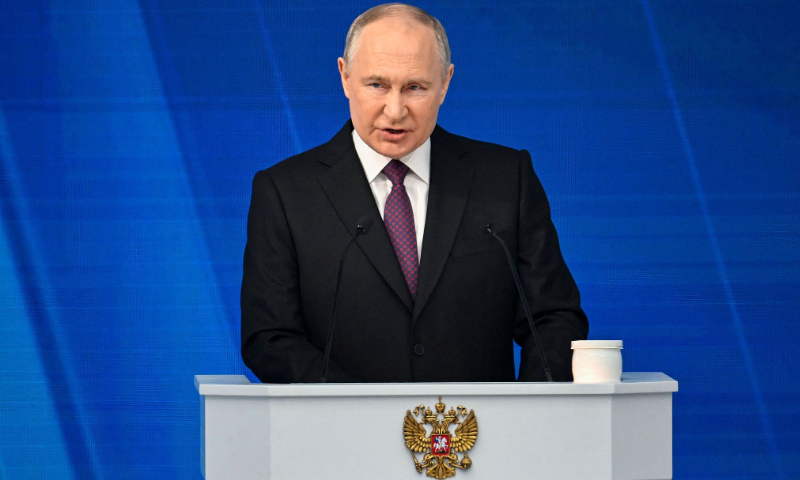
Russian President Vladimir Putin delivers his annual state of the nation address at the Gostiny Dvor conference centre in central Moscow on February 29, 2024. Photo: VCG
On Thursday, Russian President Vladimir Putin put the topic of nuclear weapons on the table. He warned that Western countries risked provoking a nuclear war if they sent troops to fight in Ukraine. "[Western nations] must realize that we also have weapons that can hit targets on their territory. All this really threatens a conflict with the use of nuclear weapons and the destruction of civilization," Putin said, while also suggesting that Western politicians should recall the fate of Nazi Germany's Adolf Hitler and France's Napoleon Bonaparte.
Putin has previously mentioned or hinted at the possibility of using nuclear weapons multiple times, but never as directly and sternly as this time. His intention is clearly to send a warning to the entire West. French President Emmanuel Macron's previous statement about not ruling out sending troops to Ukraine caused a sensation, and leaders of other major Western countries swiftly said they would not back such a move. However, Macron's remarks had already crossed a line in the escalating tensions between the West and Russia, which is not taken lightly by Moscow. Therefore, Putin directly made a big move by placing nuclear weapons on the table, indicating that if the West dares to send troops, he will dare to use nuclear weapons.
Of course, Putin was just making a threat, but issuing a nuclear threat is a serious matter in international relations. All countries need to ensure absolute safety from nuclear attacks. From threatening to use nuclear weapons to tactical preparations for their use, and ultimately launching a nuclear attack, each step in this long sequence is not a trivial matter. It is evident the extent to which Macron's remarks have angered Putin.
The conflict in Ukraine has already formed a pattern: The US and the West provide military assistance to Ukraine, but do not attack Russia's soil, while NATO forces do not directly engage in combat, in exchange for Russia only using conventional weapons. Currently, the situation is roughly balanced, with Russia having a slight advantage. The intensity of Western weapon supplies to Ukraine seems to be decreasing, and with Ukraine's smaller population and limited military resources, Russia may gradually expand its advantage.
If Western troops directly engage in combat, the situation in Ukraine will be reshaped. The participation of NATO countries' forces with advanced weapons will greatly impact the Russian front lines, and Putin will face the risk of failing. Therefore, Putin will never accept the possibility of Western countries' sending troops as discussed by Macron. By raising the issue of nuclear weapons, Putin's goal is to deter Macron and the leaders of NATO countries, preventing them from continuing in that direction.
Putin's "outburst" seems to have had some effect, with a US State Department spokesperson criticizing Putin's remarks as "irresponsible." But there has been no further provocation from the West. Macron did not immediately respond strongly to Putin, only stating that his remarks on the Russia-Ukraine conflict were carefully thought out. It is unlikely that Western leaders will respond aggressively to Putin's warning, as they do not want to escalate the situation further.
The question remains: Would Putin actually dare to use nuclear weapons? This is a huge and serious question. Generally, people believe that as long as Russia can achieve its goals in Ukraine through conventional means or maintain political dignity, Putin will not use nuclear weapons. However, if Russia faces defeat in Ukraine and the four eastern regions it has already taken are at risk of being recaptured, and if the Putin government is domestically weakened, the question of using nuclear weapons may become more open.
Western countries dare not gamble on forcing Putin to fail and step down, and do not expect him to abandon the fundamental leverage of nuclear weapons and accept the fate arranged by the West. Therefore, there has always been a voice in the West advocating for restraint. On the other hand, using nuclear weapons would be a fundamental risk, creating immense uncertainty. For Putin, it is better to hold nuclear deterrence, forcing the West to compromise or show restraint on key issues, rather than actually using the weapons. Once nuclear weapons are used, the situation will escalate, and the Kremlin is likely to lose control over what happens next.
The author is a Chinese media professional. opinion@globaltimes.com.cn


